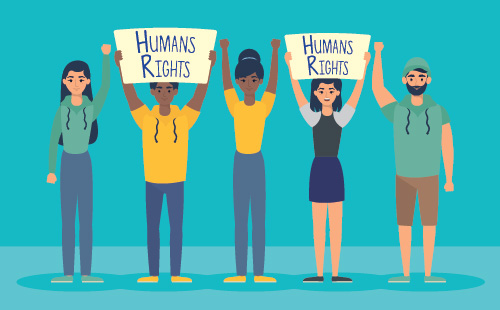Entering a country without proper documentation is often viewed as a legal violation, but it is also essential to consider the human rights implications of this issue. Many individuals who cross borders without authorization do so out of necessity, fleeing violence, economic hardship, or environmental disasters. This article takes a human rights perspective on entering a country without proper documentation, examining the ethical considerations and potential solutions to the problem.
1. The Right to Seek Asylum
One of the fundamental human rights is the right to seek asylum from persecution. The Universal Declaration of Human Rights (UDHR) guarantees that individuals fleeing persecution have the right to seek refuge in another country. This right is enshrined in international law, and many countries, including the United States, have established systems to grant asylum to those who meet the criteria.
However, many asylum seekers are forced to enter countries without proper documentation because the legal immigration process is slow, bureaucratic, or inaccessible. Asylum seekers may feel that they have no choice but to cross borders illegally in order to escape imminent danger. From a human rights perspective, these individuals should be afforded protection and due process, even if they entered without documentation.
2. The Right to Family Reunification
Family reunification is another critical aspect of human rights that is often impacted by undocumented entry. Many individuals who enter a country without proper documentation do so in search of family members who have already settled in that country. International human rights law recognizes the importance of family unity, and this principle is enshrined in the UDHR.
When individuals are separated from their families due to immigration violations, the emotional and psychological toll can be immense. The inability to reunite with loved ones can lead to a sense of alienation, trauma, and hopelessness. Human rights organizations advocate for more humane immigration policies that prioritize family reunification and ensure that individuals are not separated from their families unnecessarily.
3. The Dangers of Unauthorized Entry
Entering a country without proper documentation can also expose individuals to significant dangers. Many migrants, particularly those attempting to cross borders in remote or dangerous areas, face serious risks to their safety. Some endure perilous journeys through deserts or mountains, where they are vulnerable to exploitation, injury, or death.
Undocumented migrants are often forced to rely on smugglers or traffickers to help them cross borders, which puts them at risk of being exploited or abused. Women and children are particularly vulnerable to human trafficking and other forms of exploitation, making unauthorized entry not just a legal violation, but a human rights issue.
4. Ethical Considerations of Immigration Enforcement
From an ethical standpoint, it is essential to consider how immigration enforcement affects vulnerable populations. The use of detention facilities, family separation, and the criminalization of undocumented entry can have devastating consequences for individuals and their families. Critics of current immigration enforcement policies argue that they violate human dignity and fail to recognize the complex reasons behind migration.
A human rights perspective calls for immigration enforcement policies that prioritize compassion, protection, and fairness, while still addressing security concerns. This approach would involve creating legal pathways for migration, improving access to asylum processes, and offering support to individuals who have been displaced due to conflict, violence, or economic hardship.
5. Solutions from a Human Rights Perspective
To address the issue of entering a country without proper documentation from a human rights perspective, several solutions are necessary. These include:
- Creating more accessible legal pathways for immigration and asylum.
- Expanding humanitarian protection programs for individuals fleeing violence or disaster.
- Improving border security to ensure safety without resorting to harsh enforcement measures.
- Providing legal aid and representation to individuals who cannot afford attorneys.
These solutions would create a more humane immigration system that respects the rights and dignity of migrants while also addressing national security concerns.
6. Conclusion
The issue of entering a country without proper documentation is not just a legal problem but a human rights issue that requires a compassionate and ethical approach. By recognizing the fundamental rights of migrants, including the right to seek asylum and family reunification, governments can create a more just immigration system that balances security with human dignity. Human rights organizations continue to advocate for policies that protect vulnerable migrants and ensure that they are treated with respect and fairness, regardless of their immigration status.

